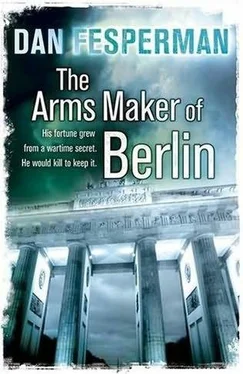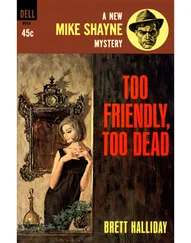Dan Fesperman - The Arms Maker of Berlin
Здесь есть возможность читать онлайн «Dan Fesperman - The Arms Maker of Berlin» весь текст электронной книги совершенно бесплатно (целиком полную версию без сокращений). В некоторых случаях можно слушать аудио, скачать через торрент в формате fb2 и присутствует краткое содержание. Жанр: Триллер, на английском языке. Описание произведения, (предисловие) а так же отзывы посетителей доступны на портале библиотеки ЛибКат.
- Название:The Arms Maker of Berlin
- Автор:
- Жанр:
- Год:неизвестен
- ISBN:нет данных
- Рейтинг книги:5 / 5. Голосов: 1
-
Избранное:Добавить в избранное
- Отзывы:
-
Ваша оценка:
- 100
- 1
- 2
- 3
- 4
- 5
The Arms Maker of Berlin: краткое содержание, описание и аннотация
Предлагаем к чтению аннотацию, описание, краткое содержание или предисловие (зависит от того, что написал сам автор книги «The Arms Maker of Berlin»). Если вы не нашли необходимую информацию о книге — напишите в комментариях, мы постараемся отыскать её.
The Arms Maker of Berlin — читать онлайн бесплатно полную книгу (весь текст) целиком
Ниже представлен текст книги, разбитый по страницам. Система сохранения места последней прочитанной страницы, позволяет с удобством читать онлайн бесплатно книгу «The Arms Maker of Berlin», без необходимости каждый раз заново искать на чём Вы остановились. Поставьте закладку, и сможете в любой момент перейти на страницу, на которой закончили чтение.
Интервал:
Закладка:
Unfortunately, I am told that they wish to speak with me again this afternoon, so who knows what the hours ahead will bring. I am told they have been similarly harsh and determined in their efforts with all of us, but suffice it to say that so fiar I have been steadfast in my refusal to speak at all about any activities other than my own, for which I have willingly assumed full responsibility as a matter of conscience. In my lowest moments I try to remember the words of Dr. Bonhoeffer. Truly, no easy grace remains for us now, so we must summon all of our faith and fortitude. I am confident that you are doing the same, and I wish you strength even as I send my love.
I am afraid that some of the others are of the opinion that Dieter must be to blame for our fate. They cite his carelessness in having kept the pamphlets at his house. Some of them have also remarked on the ease with which the officers entered his house, and the strange way that his father behaved that evening, as if he was ashamed to have anything to do with us. I suppose they see that as evidence he was already aware of what was to come. Perhaps they are right, but I have tried to keep an open mind. I have always found Dieter to be a sweet boy even though he is impulsive and has never been a careful planner. It is difficult to accept that he would have been a party to this without having revealed it through some false word or gesture. We shall see, I suppose.
Have you heard yet from your family, and your poor sister? One of my first thoughts after the terrible night of the raid was that this event would only make things worse for them, at a time when they can least afford it. Please send them my love, and, if possible, reassure me that they, too, have not been dragged into this awful abyss.
With all the idle hours now at my disposal, I confess to experiencing many moments of weakness when I try to imagine what will become of us. I do take some hope from the days that have already passed. The students who were arrested in Munich were tried and executed in only a day or two, and I believe that many of them were several years older than us. Perhaps the thinking here is that they will offer us a second chance. Or maybe I am being terribly naive in my wishful thinking, and their only intention is to drag out the process as long as possible. One of the others seems to think that we will be here for weeks, or even months, based on things that he has heard from his parents. It is the uncertainty which is hardest to take. My lowest moments seem to come when I dare to dream that we might still have a future.
All right, I must finish. The guard has promised to pick up this letter in the next hour just before the shift changes. Please stay strong, my darling.
All my love,
Liesl
As the days passed, Liesl’s notes continued, and Kurt always answered. He, of course, had not been interrogated since their imprisonment. But to cover for himself he wove elaborate descriptions of tough treatment and steadfast resistance, tales that were so deeply imagined that at times he almost believed them.
Word trickled in from the others. By the end of the second week he had received letters from everyone except Hannelore, although the only one he bothered to answer was Christoph, whom he had always admired.
Even poor Dieter sent him a message. It was obvious from his aggrieved and defensive tone that he had picked up on the suspicions of the others, and his shrillness only served to make him seem guilty. Kurt thought it best to say nothing at all on the subject, figuring that the whisper campaign and Dieter himself would do the job for him.
The third week brought devastating news from the outside. Dietrich Bonhoeffer had been arrested. Details were sketchy, and Kurt agonized that his own revelations might have somehow led to it. It might have been easier to take if Bonhoeffer had been jailed at Plötzensee, where he could have joined their network of secret correspondence. Instead, the authorities took him to Tegel Prison, just across town.
But events within Plötzensee soon reminded them that they had plenty to fear regarding their own prospects. On the evening of May 13, nearly eight weeks after their arrival, Kurt heard a stir of activity outdoors. He looked out the window to see a single file of prisoners casting long shadows as guards led them into a low building between the cellblock and the outer wall. He counted thirteen in all. It was just before 7 p.m.
For the next half hour, a series of barked commands issued from the windows of the low building. Some were followed by muffled cries, others by a great slamming thud, which echoed across the yard. Finally there was a brief period of silence, followed by a frantic spell of hammering. When that stopped, the door of the building opened and two guards emerged, carrying a wooden coffin. Two more guards followed with a second coffin. Thirteen bodies came out in all.
The next morning he got the full story from a guard, who seemed to relish explaining what all the fuss had been about. The low building was the Plötzensee death chamber. The sickening thunks had come from the slamming blade of a guillotine. The prisoners that weren’t beheaded had been hanged from hooks along a rear wall. The thirteen victims were members of a resistance cell known as the Red Orchestra, for its ties to the Soviets.
The next few months brought further killings. The peak came on August 5, when nineteen more members of the Red Orchestra filed into the death house. But the worst was yet to come. In mid-August, the news arrived in a note from Liesl: Their trials had begun. Kurt had to pretend that he knew all about it and that he, too, was going into the dock. But he could only imagine how horrible it was as he read the descriptions from the others, as each was led into the so-called People’s Court for trial and sentencing.
The worst and most vivid account was Christoph’s.
Our judge was Roland Freisler, the devil himself in his awful red robes. He wore a perched crown hat and saluted like a madman, as if pointing to the thunderclouds and awaiting their command. He hardly listened to a word I said. He just screamed and sneered and berated me at every turn. When the end came he shouted the verdict of guilty, and then his sentence, screaming to the gallery, “This beet must be uprooted and replanted! Yank him from the ground, then bury him in it!” That is his way of saying I am to be hanged ten days from now, on the 29th of August, along with Ulrich and Dieter, who I am ashamed to admit that I have sorely misjudged in this affair.
What is the word from you, and have you been to court yet? I await your news with equal measures of dread and compassion. I am determined to carry myself with dignity and defiance to the very end, and I am confident that you will do the same.
Your loyal friend,
Christoph
Kurt crumpled the note in anguish. In the following days word arrived that Klara and Hannelore had also been sentenced to hang, but not until September 5. Kurt considered writing that he, too, had been sentenced to death, to keep the others from assuming the worst. But if he did, Liesl would know later that he had lied to the others. Before he could think up what to say, the news arrived that Liesl had inexplicably-to everyone else, at least-been sentenced merely to five years in jail. The official explanation was that she was the youngest of the three girls. That gave Kurt the out that he had been seeking, because at seventeen he was the youngest of the males, and the Nazis had generally avoided executing underage suspects, as long as you weren’t a Jew. The beheading at Plötzensee the previous year of a seventeen-year-old boy-yet another pamphleteer-had led to a rare public outcry against the government.
Liesl, while overjoyed to hear his life had been spared, seemed to suspect that his family’s prominence must have had something to do with it. She concluded that this must have worked to protect her as well, because in her next note she asked, “Is there nothing your father can do for the others, or, at the very least, for Hannelore?”
Читать дальшеИнтервал:
Закладка:
Похожие книги на «The Arms Maker of Berlin»
Представляем Вашему вниманию похожие книги на «The Arms Maker of Berlin» списком для выбора. Мы отобрали схожую по названию и смыслу литературу в надежде предоставить читателям больше вариантов отыскать новые, интересные, ещё непрочитанные произведения.
Обсуждение, отзывы о книге «The Arms Maker of Berlin» и просто собственные мнения читателей. Оставьте ваши комментарии, напишите, что Вы думаете о произведении, его смысле или главных героях. Укажите что конкретно понравилось, а что нет, и почему Вы так считаете.












